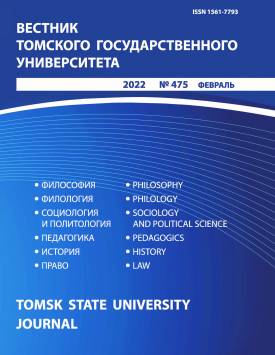Balancing the interests of the employee and the employer
The article describes the category of “balance of interests” of the employee and the employer. The analysis of judicial acts motivated by the need to observe the balance of interests is carried out. The object of the study was a set of legal norms governing the relationship between the employer and the employee. In the study, the following general scientific methods were used: analysis, synthesis, system-structural. The following specific scientific methods were used: modeling, comparative historical, peer review. The consequences of applying the category of “balance of interests” of the employee and the employer are determined. The authors state that the balance of interests is achieved by means of legal and individual regulators of labor legal relations of the employee and the employer. The article reports the following conclusions. The category “balance of interests” is not legal, but serves as a kind of a social reference point, the goal of legal regulation. “Balance of interests” as a social category must be distinguished from the legal category “balance of rights and legal interests” of the parties to the legal relationship, including labor. This legal category, in the authors' opinion, should be enshrined in legal acts, including the Labor Code of the Russian Federation, and the legal policy of our state should be built on its basis. The balance of the rights and legal interests of the employee and the employer lies in the non-equivalence of counter performance. A feature of labor relations is that one party, the employer, receives benefits incommensurably more than the other, the employee, since the employer clearly has more favorable initial opportunities. This implies additional guarantees and protective measures provided by the state to the employee as the weaker side of the employment relationship. The legal policy of the state should take into account the subject composition of labor relations. Obviously, the risks of negative consequences should not be distributed so that only the employee bears them, since they cannot foresee them when concluding an employment contract. It is necessary to develop and consolidate the legal consequences of the establishment by the law enforcement agency of violations of the balance of rights and legal interests of the employee and the employer. In other cases, such a legal consequence is an individual legal regulation carried out by the court as a manifestation of discretion. This is manifested, for example, in labor disputes about the inadmissibility of the abuse of labor law, which requires additional legal analysis in the context of the topic analyzed in this article.
Keywords
employment contract,
judicial decision,
abuse of right,
protection of labor rights,
labor disputesAuthors
| Kulakov Vladimir V. | Russian State University of Justice | evv@rsuj.ru |
| Voronov Igor Yu. | Russian State University of Justice | trudpravo@rsuj.ru |
Всего: 2
References
Общенациональный план действий, обеспечивающих восстановление занятости и доходов населения, рост экономики и долгосрочные структурные изменения в экономике (одобрен Правительством РФ 23.09.2020, протокол № 36, раздел VII) (№ П13-60855 от 02.10.2020) // СПС КонсультантПлюс.
Иванова Ю.В. Концепция баланса интересов и ее место в трудовом праве Российской Федерации // Трудовое право в России и за рубежом. 2019. № 3. С. 10-13.
Лютов Н.Л. Социальные и трудовые отношения в условиях экономического кризиса: соблюдение баланса интересов // Журнал россий ского права. 2016. № 1. С. 30-38.
Ершов В.В. Регулирование правоотношений. М. : РГУП, 2020. 564 с.
Кулаков В.В. Разумный баланс интересов как цель гражданско-правового регулирования // Российское правосудие. 2016. № S1. С. 174-185.
Ершов В.В. Правовое и индивидуальное регулирование общественных отношений как парные категории // Российский судья. 2013. № 2. С. 15-17.
Постановление Пленума ВАС РФ от 14.03.2014 № 16 «О свободе договора и ее пределах» // СПС КонсультантПлюс.
Информация Конституционного Суда РФ «Методологические аспекты конституционного контроля (к 30-летию Конституционного Суда Российской Федерации)» (одобрено решением Конституционного Суда РФ от 19.10.2021) // СПС КонсультантПлюс.
Постановление Конституционного Суда РФ от 28.01.2020 № 5-П // СПС КонсультантПлюс.
Определение Конституционного Суда РФ от 01.10.2009 № 1160-О-О, Определение Конституционного Суда РФ от 17.12.2009 № 1557-О-О // СПС КонсультантПлюс.
Постановление Конституционного Суда РФ от 17.01.2019 № 4-П // СПС КонсультантПлюс.
Зорькин В.Д. Россия и Конституция в XXI веке. М. : Норма, 2008. 591 с.
Постановление Конституционного Суда Российской Федерации от 19.05.2020 № 25-П // СПС КонсультантПлюс.
Определение Судебной коллегии по гражданским делам Верховного Суда Российской Федерации от 08.11.2021 № 67-КГ21-13-К8 // СПС КонсультантПлюс.
Определение Судебной коллегии по экономическим спорам Верховного Суда РФ от 27.03.2017 № 305-КГ16-18369 по делу № А40-213762/2014 // СПС КонсультантПлюс.
Постановление Пленума Верховного Суда РФ от 02.06.2015 № 21 «О некоторых вопросах, возникших у судов при применении законодательства, регулирующего труд руководителя организации и членов коллегиального исполнительного органа организации» // СПС КонсультантПлюс.
Постановление Арбитражного суда Поволжского округа от 05.03.2015 № Ф06-21022/2013 по делу № А57-16132/2014 // СПС Консуль-тантПлюс.
Покровский И.А. Основные проблемы гражданского права. М. : Статут, 2001. 349 с.
Актуальные проблемы гражданского права / под ред. Р.В. Шагиевой, Н.Н. Косаренко. М. : РААН, 2017. 194 с.
Туманов А. Баланс интересов работника и работодателя - недостатки конструкции // Zakon.ru. URL: https://zakon.ru/discussion/2016/2/25/balans_interesov_rabotnika_i_rabotodatelya_%E2%80%93_nedostatki_konstrukcii
Ершова Е.А. Сущность, источники и формы трудового права в Российской Федерации. М. : РАП, 2008. 452 с.
Ершов В.В. Основополагающие общетеоретические и гражданско-правовые принципы права. М. : РАП, 2010. 223 с.
Воронов И.Ю. Юридическая природа основополагающих принципов российского трудового права с позиций легизма и интегративного правопонимания // Российское правосудие. 2012. № 4 (72). С. 35-46.
Мазуренко С.В. Природа и классификация принципов российского трудового права : дис.. канд. юрид. наук. М., 2020. 186 с.
Лебедев В.М., Мельникова В.Г., Назметдинов Р.Р. Трудовое право: опыт сравнительного правового исследования / под ред. В.М. Лебедева. М. : Норма ; ИНФРА М, 2019. 480 с.

